Go Lean Commentary
It is seriously Hot-Hot-Hot out there …
So there is no intent here to be “cold and callous” … (callous = ‘feeling no emotion’).
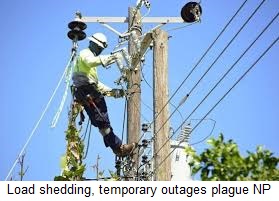 But the Bahamas’s capital city – Nassau – is having an energy crisis right now:
But the Bahamas’s capital city – Nassau – is having an energy crisis right now:
The local power generation utility (Bahamas Power & Light or BPL) is not producing enough electricity to meet the needs of the community, so they have to load-share and force black-outs/brown-outs around the island to try and facilitate some delivery some time to all their customer base. They do not want to show favoritism to one group over another, so they are leveraging the load-sharing tactic on everybody. So now instead of some people being happy and some being angry, they have obtained universality …
… everybody is angry!
———-
VIDEO – B.P.L. Load Shedding Update – https://youtu.be/fW8JGGnlvzQ
ZNSNetwork
Published on May 15, 2019
- Category: People & Blogs
Additionally, see this portrayal in this news article here (and the Appendix VIDEO below):
Title: BPL causing ‘chaos’
By: Jasper Ward, The Nassau Guardian Staff ReporterSuper Value food stores are taking a significant hit as a result of protracted power cuts, according to its owner Rupert Roberts.
Roberts said about six Super Value locations are impacted by outages daily and the company has spent around $100,000 recently on replacing equipment damaged by the outages.
He described the outages as “a nuisance” and said they create “chaos”.
“This BEC (Bahamas Electricity Corporation) crisis is more than a crisis, it’s chaos,” Roberts said at the Nassau Street store.
“It’s costing us $250,000 a year from burning up our equipment.”
He said, “I suppose our biggest concern is burning up equipment.
“…[We] burn up a $10,000 or $20,000 air conditioning [unit and] we’re always burning up compressors. We’re using up spares so fast and we’re doing emergency imports.
“Fortunately, we’re able to get them in within three or four days without flying them in. But I noticed on Saturday we had a diary case down because we’re waiting on the compressor that burned out. That’s the biggest problem.”
Roberts said it will cost about $10,000 to replace a compressor in the dairy case at the Nassau Street location. He said it is unlikely that case will be operational before Saturday.
Roberts said dairy sales were up 14 percent before the case was damaged.
Since it was damaged, sales have gone down 17 percent, he said.
Roberts said the company has twice the amount of equipment needed “because of the serious problem” of the outages.
Although the food store chain is facing challenges with the outages, Roberts said the company is “managing quite well”.
“We’ve been in this business over 50 years and we’ve had power problems for the last 50 years,” he said.
“So, we learned how to cope. We don’t run out of fuel. Years ago, when I first started in the industry, we had generators because of hurricanes but for the past 25 years we’ve had to have generators because of power outages.”
For nearly two months, communities on New Providence have experienced hours-long blackouts as part of Bahamas Power and Light’s (BPL) load shedding exercise.
Over the last few weeks, BPL has conducted nearly four-hour-long load shedding.
On Sunday, BPL Chief Executive Officer Whitney Heastie said he could not guarantee an end to load shedding exercises in the immediate future, describing BPL as being “on a cliff”.
Heastie said BPL needs 250 megawatts of generation in order to meet the summer demand.
However, it is currently running on 210 megawatts, including 105 megawatts of rental generation.
Heastie said the 40-megawatt shortfall has led to load shedding across New Providence.
Source: Posted by The Nassau Guardian daily newspaper on August 13, 2019; retrieved August 14, 2019 from: https://thenassauguardian.com/2019/08/13/bpl-causing-chaos/
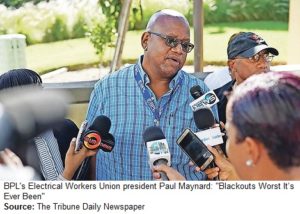
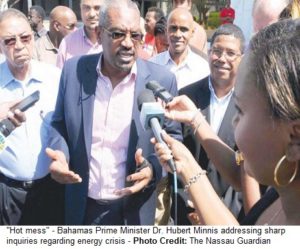
The need to explain that our statement is not “cold and callous” is due to the fact that the appearance is that “we” are ‘kicking the people when they are down’ when we make this assertion:
This energy crisis for Nassau is Self-Made!!
Wait, what?!
This is a matter of infrastructure and Nassau has had an inadequate infrastructure for a while. In fact, since the 1970’s residents on this island of New Providence (NP) have been encouraged to buy bottled-water and not consume the ‘tap’ water.
All of this is evident of the lacking municipal infrastructure. In fact, this is reminiscent of the US City of Flint, Michigan. Their infrastructure has become defective and the people there has to resort to bottled water. In Flint, that problem has now persisted for 4 years. In Nassau, it has been 40 years. (See an excerpt of our 2016 blog-commentary on the Flint crisis in the Appendix below).
Yep, self-made!
This is a BIGGER issue than water or electricity; this is an issue of the Social Contract.
The 2013 book Go Lean…Caribbean (Page 170) defines the Social Contract as the informal arrangement where citizens surrender some of their freedoms and submit to the authority of the State in exchange for protection of remaining natural and legal rights. This is why the State, in this case, the Commonwealth of the Bahamas, is allowed to operate monopolies for the water and power utilities. But any failures in these Social Contract deliveries causes repercussions and consequences. For example people leave and abandon their homeland. This relevance was detailed in a previous Go Lean commentary from July 28, 2015:
The issue of Caribbean citizens abandoning their homelands is one of the more dire threats to societal life in the region. Why do they do it?
“Push and Pull” reasons!
Push
Conditions at home drive Caribbean citizens to take flight and find refuge elsewhere. Many times these conditions are economic (jobs and entrepreneurial opportunities), security and governance related, but there are other reasons too; consider discriminations due to ethnic diversity or other lifestyle choices.Lastly, there is the new threat of Climate Change. While this is a threat for the whole world, the Caribbean is on the frontline. Though there is some debate as to the causes of climate change, there is no question as to its outcome: temperatures are rising, droughts prevail, and most devastating, hurricanes are now more threatening. A Caribbean elevation plan must address the causes of climate change and most assuredly its consequences. …
Now, the anecdotal experience is that there is a need to mitigate excessive heat in the region for an even longer season. How do we mitigate excessive heat?
Air conditioning!
But this cure may at times be worse than the disease.
Air conditioning requires even greater energy consumption, (the Caribbean has among the highest energy costs in the Western Hemisphere); the Go Lean book posits that the average costs of energy can be decreased from an average of US$0.35/kWh to US$0.088/kWh in the course of the 5-year term of this roadmap; (Page 100).
In addition, the release of Chlorofluorocarbons (CFC’s) in the air-conditioning process is a contributor of greenhouse gases into the atmosphere.
The status quo needs remediation!
The Bahamas should have remediated these infrastructural problems years ago – the price is too high to allow it to linger. In addition to the societal abandonment threat; there are life-and-death issues associated with convalescing citizens needing continuous power supply – see photo here:
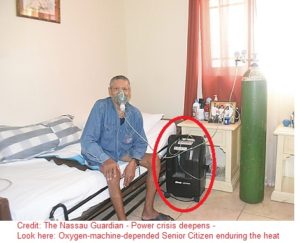
That’s the problem, now what is the solution?
In addition to the voluminous number of blog-commentaries on infrastructure – see this recent submission from July 26, 2019 – the Go Lean book presented strategies, tactics and implementations that must be pursued, not just for the Bahamas, but for the whole Caribbean region – all 30 member-states. In fact, the book presents one advocacy (Page 176) specifically focused on Public Works, entitled: “10 Ways to Impact Public Works“. These “10 Ways” include the following highlights, headlines and excerpts:
| 1 | Lean-in for the Caribbean Union Trade Federation (CU).
The CU is chartered to unify the Caribbean region into one Single Market of 42 million people across 30 member-states, thereby re-engineering the economic engines in and on behalf of the region, including a currency & monetary union. This new eco-system allows for the design, funding and construction of Public Works and Infrastructural projects. The federal agency within the CU’s Department of the Interior has the scope for the Caribbean much like the Corps of Engineers has for the US. (Plus the CU will collaborate with the US Corps for projects related to Puerto Rico and the Virgin Islands). There are a number of inter-state projects that must be coordinated on the federal level. There will also be projects that are “Too Big for One State” that will be facilitated by the CU. In addition, all CU efforts must comply with the Art in Public Places mandate, so sculptures and statutes will be embedded in projects or the project itself can be a work of art (bridges, water towers, building architecture). For existing projects that fail due to financial shortfalls, the CU will accommodate dissolution or reorganization in the federal courts, bringing balance to the process to all stakeholders. |
| 2 | Union Atlantic Turnpike |
| 3 | Pipelines and PCP (Pneumatic Capsule Pipeline) |
| 4 | Regional Power Grid
The CU will facilitate the installation of a regional power grid, and power sharing between member-states, with underwater and above-ground high-intensity wiring to alternate energy plants: wind/tidal turbines, solar panel & natural gas. |
| 5 | Self-Governing Entities (SGE) |
| 6 | Enterprise Zones |
| 7 | Empowerment Zones |
| 8 | Monopolies
The UN grants the CU the monopoly rights for an Exclusive Economic Zone, so the focus must be on quality delivery. The CU plan is to liberalize management of monopolies, with tools like ratings/rankings against best practices. Plus technological accommodations for ICT allows for cross-competition from different modes (satellite, cable, phone). |
| 9 | Cooperatives
The CU will task utility cooperatives with the delivery of some public utilities such as Air Chillers; Refrigerated Warehouses to its members. This strategy shares the cost of the “Works” installation across the full co-op membership. |
| 10 | Capital Markets
A single market and currency union will allow for the emergence of viable capital markets for stocks and bonds (public and private), thereby creating the economic engine to fuel growth and development. This forges financial products for “pre” disaster project funding (drainage, levies, dykes, sea walls) and post disaster recovery (reinsurance sidecars). |
The Go Lean book doubles-down on the concept of leveraging across a larger population base so that BIGGER infrastructure projects can be facilitated in the region – on land or in the waters – see Photo here. Imagine large arrays of solar panels, wind turbines, tidal generators, geo-thermal energy captured at the volcanic hot zones, and even Natural Gas as a cleaner-cheaper fossil fuel. These energy options are realistic and should be available to us now in the Caribbean, so they should be explored and deployed. This, a regional power grid, is the energy prime directive for this Go Lean movement.

This theme – exploiting alternative options for the economic, security and governing empowerments in the region – aligns with many previous Go Lean commentaries; see a sample list here:
| https://goleancaribbean.com/blog/?p=17925 | ‘We’ have repeatedly failed the lessons from ‘Infrastructure 101’ |
| https://goleancaribbean.com/blog/?p=17280 | Way Forward – For Energy: ‘Trade’ Winds |
| https://goleancaribbean.com/blog/?p=13985 | EU Assists Barbados in Renewable Energy Self-Sufficiency |
| https://goleancaribbean.com/blog/?p=12994 | The Science of ‘Power Restoration’ |
| https://goleancaribbean.com/blog/?p=12466 | 12 Caribbean Member-states have ‘Volcanic Energy’ to Exploit |
| https://goleancaribbean.com/blog/?p=10367 | The Science of Sustenance – Green Batteries |
| https://goleancaribbean.com/blog/?p=5155 | Green Energy Solution: Tesla unveils super-battery to power homes |
| https://goleancaribbean.com/blog/?p=4897 | US Backs LNG Distribution for Caribbean Energy Solutions |
| https://goleancaribbean.com/blog/?p=915 | Go ‘Green’ … Caribbean |
Make no mistake, energy is a basic need!
The failure for a community to have continuous supply of energy is an energy crisis. (This means you Bahamas).
Enough already!
Now is the time for all Caribbean stakeholders to prepare for the empowerments of Green-Energy solutions. It is past-time for a regional power grid:
- generation – Green options (solar, wind turbines, tidal, geo-thermal and natural gas)
- distribution – Underwater cables to connect individual islands
- consumption – efficient battery back-ups for home deployments.
These changes are coming … one way or another.
For you government revenue institutions who may be overly dependent of fuel taxes and surcharges – you are hereby put on notice:
Changes are afoot. We will succeed; we will make our Caribbean homeland a better place to live, work and play.
About the Book
The book Go Lean…Caribbean serves as a roadmap for the introduction and implementation of the technocratic Caribbean Union Trade Federation (CU), for the elevation of Caribbean society – for all member-states. This CU/Go Lean roadmap has these 3 prime directives:
- Optimization of the economic engines in order to grow the regional economy to $800 Billion and create 2.2 million new jobs.
- Establishment of a security apparatus to ensure public safety and protect the resultant economic engines.
- Improve Caribbean governance to support these engines, including a separation-of-powers between the member-states and CU federal agencies.
The Go Lean book provides 370-pages of turn-by-turn instructions on “how” to adopt new community ethos, plus the strategies, tactics, implementations and advocacies to execute so as to reboot, reform and transform the societal engines of Caribbean society.
Download the free e-Book of Go Lean … Caribbean – now!
Who We Are
The movement behind the Go Lean book – a non-partisan, apolitical, religiously-neutral Community Development Foundation chartered for the purpose of empowering and re-booting economic engines – stresses that reforming and transforming the Caribbean societal engines must be a regional pursuit. This was an early motivation for the roadmap, as pronounced in the opening Declaration of Interdependence (Pages 12 – 13):
xi. Whereas all men are entitled to the benefits of good governance in a free society, “new guards” must be enacted to dissuade the emergence of incompetence, corruption, nepotism and cronyism at the peril of the people’s best interest. The Federation must guarantee the executions of a social contract between government and the governed.
xvi. Whereas security of our homeland is inextricably linked to prosperity of the homeland, the economic and security interest of the region needs to be aligned under the same governance. Since economic crimes … can imperil the functioning of the wheels of commerce for all the citizenry, the accedence of this Federation must equip the security apparatus with the tools and techniques for predictive and proactive interdictions.
xxiv. Whereas a free market economy can be induced and spurred for continuous progress, the Federation must install the controls to better manage aspects of the economy: jobs, inflation, savings rate, investments and other economic principles. Thereby attracting direct foreign investment because of the stability and vibrancy of our economy.
Sign the petition to lean-in for this roadmap for the Caribbean Union Trade Federation.
——————–
Appendix VIDEO – Another B.P.L. Blackout – https://youtu.be/fOT0gfvSchM
ZNSNetwork
Published on Jul 2, 2019
- Category: People & Blogs
——————–
Appendix – Excerpts from previous Commentary: Flint, Michigan – A Cautionary Tale – January 19, 2016
[The City of] Flint serves as a “cautionary tale” for other communities near “Failed City/Failed State” status. From this perspective, this community may be a valuable asset to the rest of the world and especially to the Caribbean.
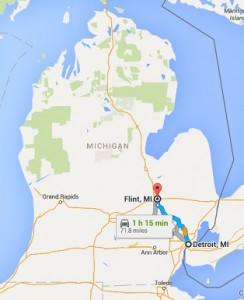 The publishers of the book Go Lean…Caribbean are here in Detroit to “observe and report” the turn-around and rebirth of the once-great-but-now-distressed City of Detroit and its metropolitan areas, including Flint. (Previous commentaries featured the positive role model of the City of Ann Arbor).
The publishers of the book Go Lean…Caribbean are here in Detroit to “observe and report” the turn-around and rebirth of the once-great-but-now-distressed City of Detroit and its metropolitan areas, including Flint. (Previous commentaries featured the positive role model of the City of Ann Arbor).
What happened here?
According to the Timeline in the Appendix, Flint, MI suffered this fate as a chain reaction to its Failed-State status. Outside stakeholders – Emergency Managers – came into the equation to execute a recovery plan with focus only on the Bottom-Line. The consideration for people – the Greater Good – came second, if at all. They switched water sources, unwisely!
The assertion of the Go Lean book is that the Caribbean region can benefit from lessons learned from Good, Bad and Ugly governance. The book serves as a roadmap for the introduction and implementation of the technocratic Caribbean Union Trade Federation (CU). The Go Lean book and related commentaries call on citizens of the Caribbean member-states to lean-in to the empowerments described in the roadmap for elevation. This will require a constant vigil to ensure the Greater Good as opposed to personal gains.
…
See VIDEO here of the story in the national media …
VIDEO – Citizens’ Anger Continues Over Toxic Water in Flint, Michigan – http://abcnews.go.com/WNT/video/citizens-anger-continues-toxic-water-flint-michigan-36348795 –
…
This tragic story – cautionary tale of Flint – is an analysis of failure in the societal engines of economics, security and governance. These 3 facets are presented in the book Go Lean … Caribbean as the three-fold cord for societal harmony; for any society anywhere. The Caribbean wants societal harmony; we must therefore work to optimize all these three engines. As exhibited by Flint, this is easier said than done. This heavy-lifting is described in the book as both an art and a science.
The focus in this commentary is a continuation in the study of the societal engine of governance; previously, there was a series on economics and one on security. This commentary though, focuses on the bad eventually of Social Contract failures. The Social Contract refers to the unspoken expectations between citizens and the State. In many cases, State laws limit ownership of all mineral rights to the State; so citizens will be dependent on State systems to supply water. In the case of Flint, the City’s Water and Sewage Department has a monopoly; this supply is the only option for residents!
The Go Lean book describes “bad actors” wreaking havoc on the peace and security of the community. The book relates though that “bad actors” are not always human; they include bad events like natural disasters and industrial spills. Plus, actual “bad actors” may have started out with altruistic motives, good intentions. This is why the book and accompanying blogs design the organization structures for the new Caribbean with checks-and-balances, mandating a collaborative process, because sometimes even a well-intentioned individual may not have all the insight, hindsight and foresight necessary to pursue the Greater Good. This the defect of the Michigan Emergency Manager structure; it assigns too much power to just one person, bypassing the benefits of a collaborative process. This is one reason why this review is important: power corrupts…everyone … everywhere.
…
We must do better, than Flint! (Flint must do better; too many lives are involved).
 We know that “bad actors and bad incidences” will always occur, even in government institutions, so we must be “on guard” against abusive influences and encroachments to Failed-State status. The Go Lean roadmap calls for engagement and participation from everyone, the people (citizens), institutions and government officials alike. We encouraged all with benevolent motives to lean-in to this roadmap, to get involved to effect a turnaround for the Caribbean Failed-States.
We know that “bad actors and bad incidences” will always occur, even in government institutions, so we must be “on guard” against abusive influences and encroachments to Failed-State status. The Go Lean roadmap calls for engagement and participation from everyone, the people (citizens), institutions and government officials alike. We encouraged all with benevolent motives to lean-in to this roadmap, to get involved to effect a turnaround for the Caribbean Failed-States.
Our Caribbean stakeholders deserve the best … from their leaders.
